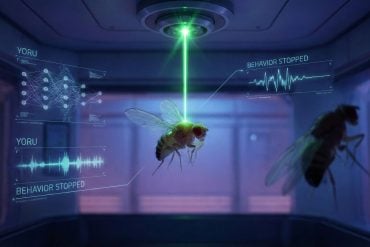Summary: 200mg of caffeine, the equivalent of a strong cup of coffee, helps boost problem-solving skills but has no effect on creative thinking.
Source: University of Arkansas
Caffeine increases the ability to focus and problem solve, but a new study by a University of Arkansas researcher indicates it doesn’t stimulate creativity.
“In Western cultures, caffeine is stereotypically associated with creative occupations and lifestyles, from writers and their coffee to programmers and their energy drinks, and there’s more than a kernel of truth to these stereotypes,” wrote Darya Zabelina, assistant professor of psychology and first author of the study recently published in the journal Consciousness and Cognition.
While the cognitive benefits of caffeine — increased alertness, improved vigilance, enhanced focus and improved motor performance — are well established, she said, the stimulant’s affect on creativity is less known.

In the paper, Zabelina differentiates “convergent” from “divergent” thinking. The former is defined as seeking a specific solution to a problem, for example, the “correct” answer. The latter is characterized by idea generation where a large set of apt, novel or interesting responses would be suitable. Caffeine was shown to improve convergent thinking in the study, while consuming it had no significant impact on divergent thinking.
For the study, 80 volunteers were randomly given either a 200mg caffeine pill, equivalent to one strong cup of coffee, or a placebo. They were then tested on standard measures of convergent and divergent thinking, working memory and mood. In addition to the results on creativity, caffeine did not significantly affect working memory, but test subjects who took it did report feeling less sad.
“The 200mg enhanced problem solving significantly, but had no effect on creative thinking,” said Zabelina.
“It also didn’t make it worse, so keep drinking your coffee; it won’t interfere with these abilities.”
About the University of Arkansas: The University of Arkansas provides an internationally competitive education for undergraduate and graduate students in more than 200 academic programs. The university contributes new knowledge, economic development, basic and applied research, and creative activity while also providing service to academic and professional disciplines. The Carnegie Foundation classifies the University of Arkansas among fewer than 3% of colleges and universities in America that have the highest level of research activity. U.S. News & World Report ranks the University of Arkansas among its top American public research universities. Founded in 1871, the University of Arkansas comprises 10 colleges and schools and maintains a low student-to-faculty ratio that promotes personal attention and close mentoring.
Source:
University of Arkansas
Media Contacts:
Darya Zabelina – University of Arkansas
Image Source:
The image is in the public domain.
Original Research: Open access
“Percolating ideas: The effects of caffeine on creative thinking and problem solving”. Darya L. Zabelina, Paul J. Silvia.
Consciousness and Cognition doi:10.1016/j.concog.2020.102899.
Abstract
Percolating ideas: The effects of caffeine on creative thinking and problem solving
Caffeine is the most widely consumed psychotropic drug in the world, with numerous studies documenting the effects of caffeine on people’s alertness, vigilance, mood, concentration, and attentional focus. The effects of caffeine on creative thinking, however, remain unknown. In a randomized placebo-controlled between-subject double-blind design the present study investigated the effect of moderate caffeine consumption on creative problem solving (i.e., convergent thinking) and creative idea generation (i.e., divergent thinking). We found that participants who consumed 200 mg of caffeine (approximately one 12 oz cup of coffee, n = 44), compared to those in the placebo condition (n = 44), showed significantly enhanced problem-solving abilities. Caffeine had no significant effects on creative generation or on working memory. The effects remained after controlling for participants’ caffeine expectancies, whether they believed they consumed caffeine or a placebo, and changes in mood. Possible mechanisms and future directions are discussed.






